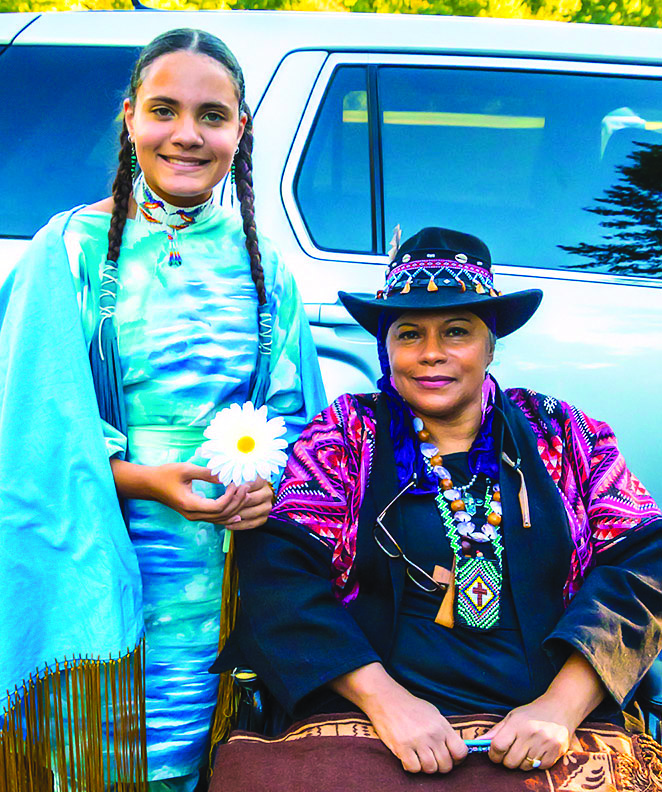Long before European colonists stepped foot in what is now called the town of Natick, Native American people had their own history here. The Natick Praying Indian (NPI) tribe has a special relationship with Natick and the Eliot Church, located at 45 Eliot St. The tribe continues their traditions and honors their past, while also partaking in new experiences, inviting the community to celebrate their culture alongside them.
Hope in Tragedy
Thomas Waban was the first Native American to work with Reverend John Eliot, the missionary who first shared the Christian faith with Waban and his people. Together, they established the first indigenous Christian church of this country in 1651. Their legacies are memorialized throughout Massachusetts, from Lake Waban in Wellesley to John Eliot Square District in Roxbury.
However, an atrocity clouds this history. In the winter of 1675, hundreds of Native Americans were exiled to Deer Island during King Philip’s War. NPI Chief Caring Hands is a descendant of the survivors, and she has a clear response for those that believe the tribe’s faith was forced upon them, or not genuine.
“That was not so with our people. Our people believed,” she said. “When they were placed on that island and suffered, watching their children, old people and pregnant women die from exposure and starvation; after 500 went on the island, and 167 came off, they were still Christian. That is how I know their faith was true.”
Although Eliot himself did not desire the exile, no Christian missionaries endeavored to rescue them. “I venture to guess that our people were really shocked when they were placed on that island by people they thought were their brethren,” Chief Caring Hands reflected.
Worshipping in Natick
The faith of the NPI tribe endured through incredible hardship, and remains as vital to the identity of the tribe as it was after the Deer Island exiling. Eliot Oak, the tree under which the NPI tribe first worshipped, once stood where the Eliot Church now stands, and the tribe worships there today.
Reverend Eliot was of Protestant faith, but the NPI tribe does not have allegiance to a particular denomination. “Our allegiance is to God, the Creator, the Father. That’s what makes us the Praying Indians. We are Christian, and we are native, and they come together,” Chief Caring Hands said.
Though the spirituality of the NPI tribe was grounded through Reverend Eliot’s teaching, relationships between the NPI tribe and the colonists became strained.
“The one thing that Waban wanted at the time the NPI village was created, was to welcome others to come in and come to the church,” Chief Caring Hands explained. “But, it was very clear that the colonists did not want to sit amongst the Indians.”
A Tribe’s Return
The Eliot Church was established separately from the NPI tribe, and the dissociation remained until 2012, when the current congregation formally invited the tribe back into the church.
Chief Caring Hands is thankful to the church for their decision, and wants to extend the welcome even further. “After we enjoyed and soaked in being where we were, and being back after all of this time, we wanted to fulfill Waban’s wish to have all people welcomed,” she said.
Tata Lyn, Chief Caring Hands’ husband, echoed these sentiments during a public service on March 11. “Here we are some 300 years later inviting all folks to worship with us,” he said. “We’re open to all folks and see all the different backgrounds, colors and ethnicities that join us every month, and we’re very honored to have your presence.”
Since the advent of public services, the tribe has had many firsts, including dedications, christenings, and musical performances. Service is begun with the Lord’s Prayer spoken in the NPI language, and includes preaching, dancing and singing, and sharing from congregation. One of the centuries-old traditions is a march around the sanctuary to the beat of a drum, the instrument the NPI tribe has rallied to since its beginnings.
NPI Culture Continued
The NPI tribe holds their services on the second Saturday of every month, from 2 p.m. to 4:30 p.m. All are welcome regardless of religious background, and are free to respectfully experience the culture and faith of the tribe.
Another way to learn about the tribe is to purchase the documentary Praying Town, created by local filmmaker Zadi Zokou of Zokou Productions.
“There are many times people talk about the Praying Indians, but they don’t come to the Praying Indians to know,” Chief Caring Hands said of “Praying Town.” “This is the best documentary ever done on our people. The sensitive inclusion of an NPI interview acknowledges our presence today.”
Visit www.zzproductions.co for information about “Praying Town,” and to order copies, email zokouzadi@hotmail.com. To learn more about the Natick Praying Indian tribe, visit www.natickprayingindians.org.
Look for part two of this article series in the June edition of Natick Local Town Pages, which will feature the life experiences, perspectives, and sage words of Chief Caring Hands.

Issue Date:
May, 2017
Article Body:
